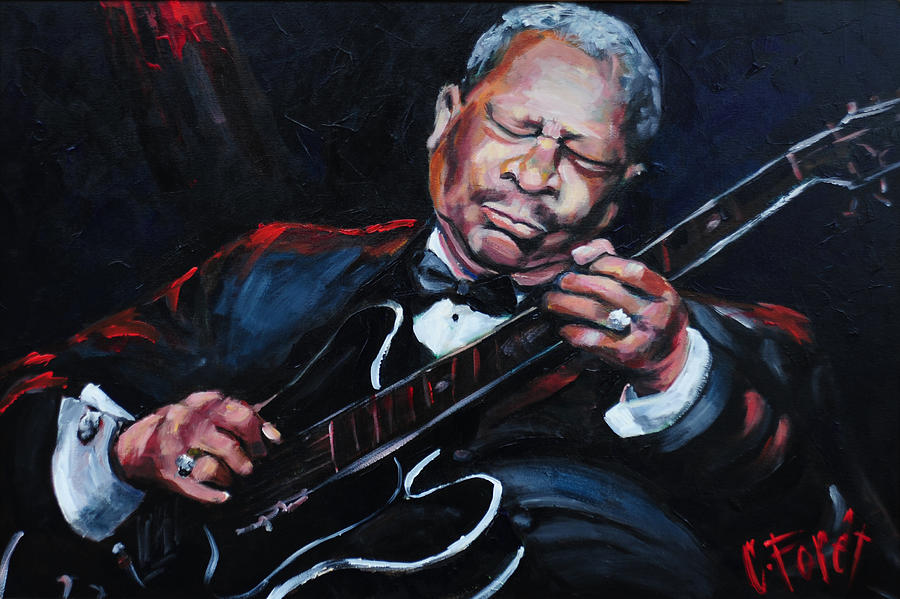It
was with great sadness to learn a couple of weeks ago the great blues legend B.B. King passed away. He died on May 14th. From Billboard, which wrote a magnificent
obituary and worth reading every word of it:
B.B. King, the last of
the Southern-born blues musicians who defined modern electric blues in the
1950s and would influence scores of rock and blues guitarists, has died. He was
89.
The Mississippi-born
guitarist, who had suffered from Type II diabetes for two decades, died
peacefully in his sleep at 9:40 p.m. PDT Thursday at his home in Las Vegas, his
attorney Brent Bryson tells the AP. In October, King fell ill during a show and
after being diagnosed with dehydration and exhaustion, canceled his concert
tour and had not returned to touring at the time of his death.
With his trusty Gibson
guitar Lucille, King developed his audiences in stages, connecting with
African-Americans region by region in the 1950s and '60s, breaking through to
the American mainstream in the '70s and becoming a global ambassador for the
blues soon thereafter, becoming the first blues musician to play the Soviet
Union.
I
don’t know what’s left to say about B. B. King.
He was truly one of the greats, a great vocalist, a great guitarist, and
a great song writer.
Born Riley King on Sept.
16, 1925, in the Mississippi Delta near Itta Bena, he was raised on a cotton farm by his
maternal grandmother, Elnora. His mother died he was 9, his grandmother when he
was 14. He picked cotton on a plantation in Indianola, Miss., and his first
recording, made in 1940, was the “Sharecropper Record” in 1940.
King learned the guitar
by studying Jefferson, Walker, Lonnie Johnson and his cousin, Booker “Bukka”
White, who taught him the finer points of guitar.
“I guess the earliest
sound of blues that I can remember was in the fields while people would be
pickin’ cotton or choppin’ or something,’ ” King recalled in a 1988 interview
with Living Blues. “When I play and sing now, I can hear those same sounds that
I used to hear then.”
He believed gospel
singing was a path to success and in 1943 joined the Famous St. John Gospel
Singers, which was featured on WGRM, a gospel radio station. He sang in church
on Sundays, then changed hats in the evenings to play for tips on the street
corners of Indianola.
That same year he joined
the Army, but his stay lasted less than three months. He spent his service days
driving a tractor on a Delta plantation and his weekends at Indianola music
spots soaking up the likes of Duke Ellington, Count Basie and Robert Nighthawk.
At that time, he decided he would attempt to play blues rather than gospel.
I
should say that King’s style of blues did not initially resonate with me when I
was younger. He used a big band ensemble
more so than any other of the great blues legends, giving it a jazzy texture
which struck me as out of the true Mississippi Delta blues tradition. But in time it did grow on me. I remember seeing King at his New York City blues
club once (gosh, I wish I could remember when that was) and watching him live
persuaded me over. Forget the
arrangement, he really was a great guitarist.
From Billboard:
King, whose best-known
song was "The Thrill is Gone," developed a commercial style of the
blues guitar-playing long on vibrato and short, stinging guitar runs while
singing almost exclusively about romance. Unlike the musicians who influenced him,
Blind Lemon Jefferson and T-Bone Walker, for example, or his contemporaries
Muddy Waters, John Lee Hooker and Howlin Wolf whose music bore geographic
identities, King's music was not tethered to the style heard at the Mississippi
plantation he was born on or the Beale Street sound in Memphis where he first
established his career.
He took rural 12-bar
blues and welded it to big city, horn driven ensembles populated with musicians
who understood swing and jazz, but played music that worked a groove and
allowed King's honey-sweet vocals and passionate guitar licks to stand out. His
solos often started with a four- or five-note statement before sliding into a
soothing, jazzy phrase; it's the combination of tension and release that King
learned from gospel singers and the jazz saxophonists Lester Young and Johnny
Hodges.
Well
let’s sample some of his work.
Here’s
what I mean about the band arrangement mixed with his beautifully lyrical
guitar riffs.
But
then he could get down with traditional blues arrangement just like the best of
them.
And
he could just capture an emotion. He
understood that the blues are about a core emotion.
As
a musician, and especially a bluesman, King had regrets in how he had not been
the best father in the world. He
fathered fifteen children with several women, and he married two of them. There is an interview (I searched but couldn’t
find it) where he confesses and lives up to his mistakes. In the end, he made peace with his sins. I just love this Sinner’s Prayer he does with
Ray Charles.
Finally
one has to end a B. B. King retrospective with his greatest hit, possibly the
greatest blues song ever written and recorded.
I
could listen to that song every day of my life.
B. B. you may be gone, but thrill is still there. Rest in eternal light.


No comments:
Post a Comment